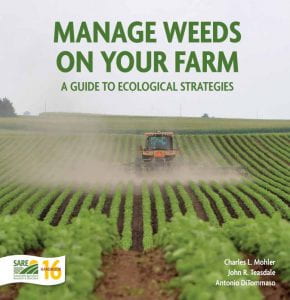The Cornell Weed Ecology lab is conducting a survey on the most common weeds and the most difficult to manage weeds on dairy and field crop farms in New York State. If you grow corn, soy, hay, pasture, or small grains in New York State, please fill a 5-minute survey from the Cornell Weed Ecology Lab.
Background on this survey: Dr. Toni DiTommaso’s Weed Ecology Lab is currently working on a project to determine what weeds are currently problematic in field crops compared to twenty years ago; assess farmer knowledge and concerns regarding regional weather changes and perceived weather-related weed management challenges; and related adaptations already in use in response to these changes.
Over the course of the three year project, project team members will be utilizing existing research information to develop a set of tools to educate farmers on expected changes to weed populations, weed management, and weed/crop competition as weather patterns shift in the near- to medium- term (~ the next 20 years). The project also seeks to connect the agricultural sector to existing models utilized by invasive species managers to track range shifting plants which could be applied to agronomic weeds in New York.
Also check out this new book that helps farmers outsmart their weeds!
 Cornell and USDA scientists have produced the definitive guide to understanding agricultural weeds and how to manage them efficiently, effectively and ecologically. The 416-page book, “Manage Weeds on Your Farm: A Guide to Ecological Strategies,” was published by the USDA’s Sustainable Agriculture Research and Education (SARE) Program.
Cornell and USDA scientists have produced the definitive guide to understanding agricultural weeds and how to manage them efficiently, effectively and ecologically. The 416-page book, “Manage Weeds on Your Farm: A Guide to Ecological Strategies,” was published by the USDA’s Sustainable Agriculture Research and Education (SARE) Program.
“It’s an amazing resource, exactly the kind of publication growers are looking for,” said Chris Smart, director of the School of Integrative Plant Science (SIPS) in Cornell’s College of Agriculture and Life Sciences. “It is both thorough and user-friendly. And who isn’t looking for better strategies to control weeds on their farm?”

